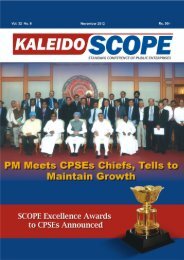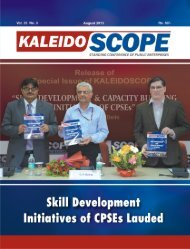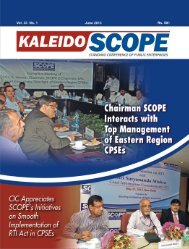Skill Development - scope
Skill Development - scope
Skill Development - scope
You also want an ePaper? Increase the reach of your titles
YUMPU automatically turns print PDFs into web optimized ePapers that Google loves.
further explored. Quality training<br />
infrastructure could be established<br />
within the core business sector of<br />
competence, which would have<br />
the added advantage for trainees<br />
getting hands-on industry experience<br />
as part of these trainings and<br />
a good chance of getting placed<br />
within the industry. This would<br />
also help in bridging the shortages<br />
of skilled manpower within<br />
the sector. Another collaborative<br />
approach could be for enterprises<br />
working in the same broad sector<br />
to come together and create<br />
high quality vocational training<br />
institutions that could cater to the<br />
critical needs of the specific sector<br />
by creating a pool of skilled<br />
manpower equipped with trainings<br />
that are demand-driven. For<br />
instance, enterprises in the power<br />
sector, in mining, in manufacturing<br />
and in the oil and gas sectors,<br />
could pool their CSR resources<br />
to form four National Centres of<br />
Excellence, catering to the specific<br />
needs of these sectors, especially<br />
in under-served areas. These are<br />
potential ways in which industry<br />
can take on part of the responsibility<br />
of training, instead of merely<br />
complaining about the lack of<br />
job-ready skills in specific sectors<br />
of operation.<br />
While channelizing CSR budgets<br />
towards vocational training activities<br />
is one option of contributing<br />
to the skill development ecosystem<br />
of the country, it is definitely<br />
not the only one. Industry- led<br />
apprenticeships could be another<br />
Last, but surely not the least,<br />
is the actual recognition and<br />
reward of the skill or hunar<br />
of a person across the entire<br />
ecosystem especially by<br />
industry. Without appropriate<br />
salary increases for enhanced<br />
skills the incentive to upskill<br />
remains elusive. PSEs can<br />
lead this movement by setting<br />
benchmarks themselves<br />
in recognizing and rewarding<br />
higher skills sets at all levels.<br />
Without doubt, this is the<br />
most apposite time to reflect<br />
upon the current situation<br />
and take active interventions<br />
to change the same.<br />
great means to ensure hands-on<br />
trainings which could also efficiently<br />
facilitate seamless transition<br />
into the workplace. In countries<br />
like Germany, Switzerland<br />
over 60% of young people enter<br />
the job market through this<br />
stream as apprentices and the<br />
system is flexible enough to even<br />
enable lateral entry and simultaneously<br />
offers a path for upward<br />
mobility. The most impressive<br />
part of this ‘dual education system’<br />
is the role that industry plays<br />
in it, with almost seventy per cent<br />
of the training happening within<br />
the industry. In sharp contrast,<br />
India so far has the lowest level<br />
of in-firm training even among<br />
the BRIC countries and we currently<br />
produce merely 2.5 lakh<br />
apprentices per year. This must<br />
change and PSEs could play an<br />
important role through this route<br />
of offering on-the-job trainings<br />
by hiring a much larger number<br />
of apprentices and offering them<br />
hands-on skills enhancement.<br />
Last, but surely not the least, is<br />
the actual recognition and reward<br />
of the skill or ‘hunar’ of a person<br />
across the entire ecosystem especially<br />
by industry. Without<br />
appropriate salary increases for<br />
enhanced skills the incentive to<br />
upskill remains elusive. PSEs can<br />
lead this movement by setting<br />
benchmarks themselves in recognizing<br />
and rewarding higher skill<br />
sets at all levels. Without doubt,<br />
this is the most apposite time to<br />
reflect upon the current situation<br />
and take active interventions to<br />
change the same. Be this through<br />
innovative use of CSR funds for<br />
skill development, offering onthe<br />
job trainings to the youth or<br />
then coming up with innovative<br />
partnerships that recognize the<br />
value of skills, I must underline<br />
again that PSEs have a crucial<br />
role to play.<br />
12 Kaleido<strong>scope</strong> July 2013













